高中英语必修2 Unit 3 Computers--Reading 课件 (共19张PPT)
文档属性
| 名称 | 高中英语必修2 Unit 3 Computers--Reading 课件 (共19张PPT) | 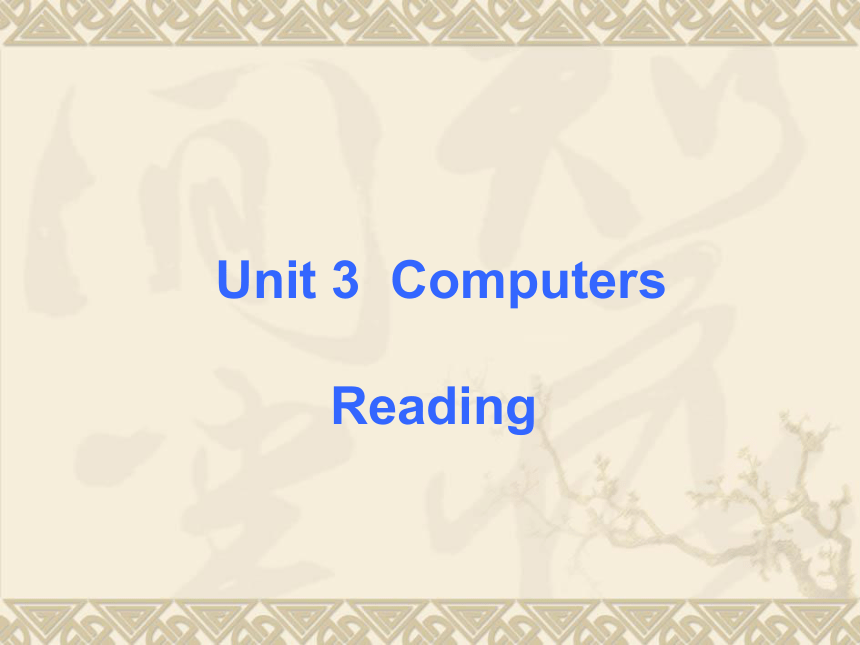 | |
| 格式 | zip | ||
| 文件大小 | 19.6MB | ||
| 资源类型 | 教案 | ||
| 版本资源 | 人教版(新课程标准) | ||
| 科目 | 英语 | ||
| 更新时间 | 2016-07-12 10:01:26 | ||
图片预览

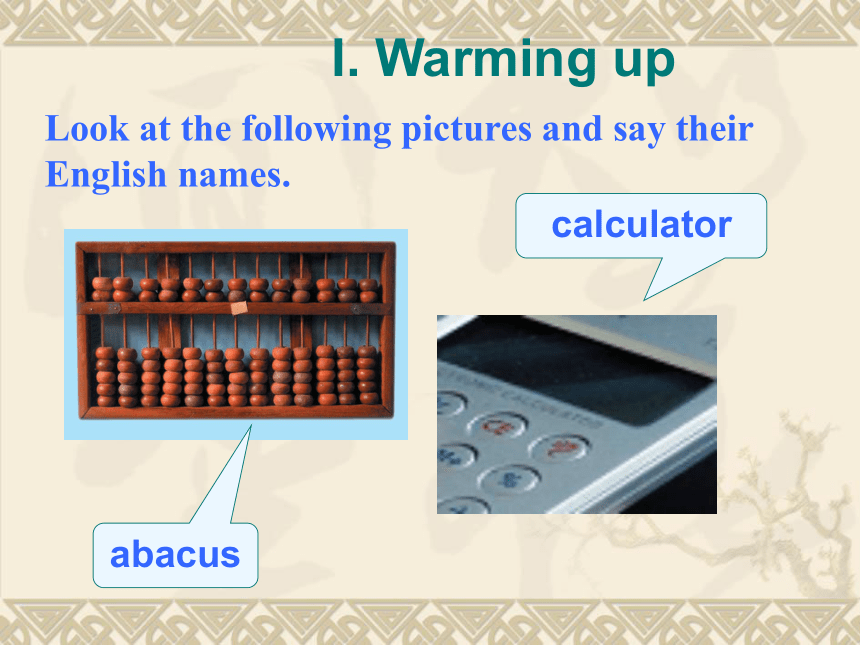
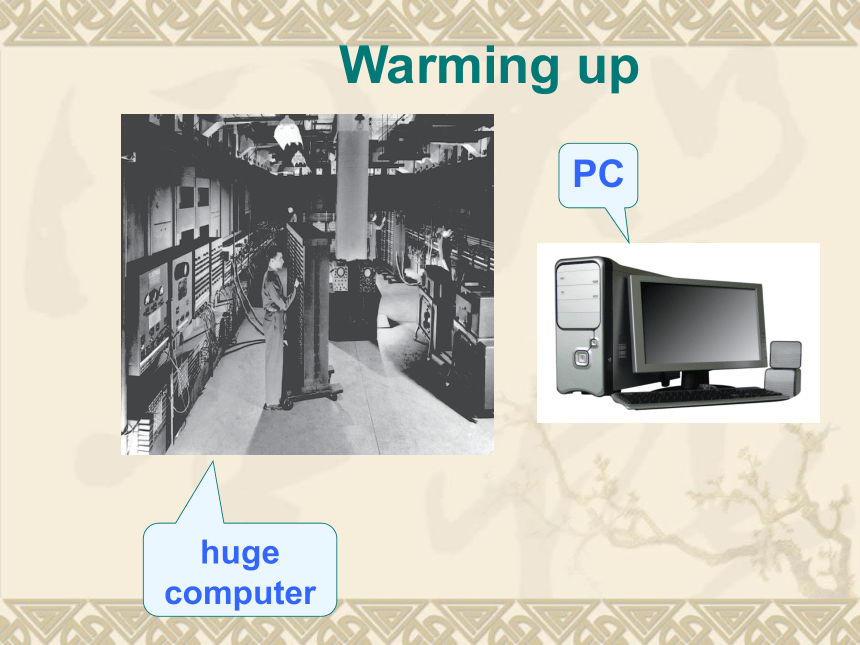
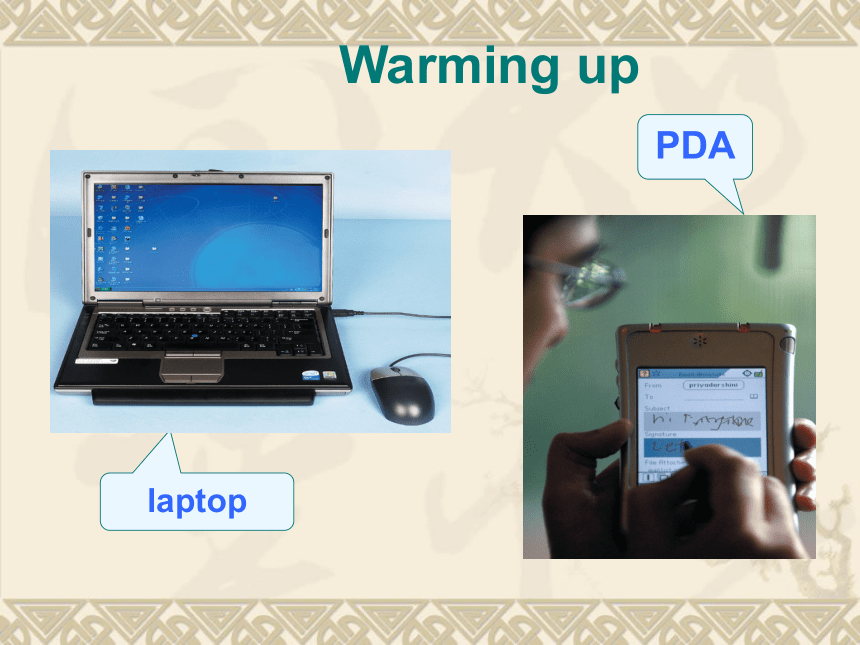
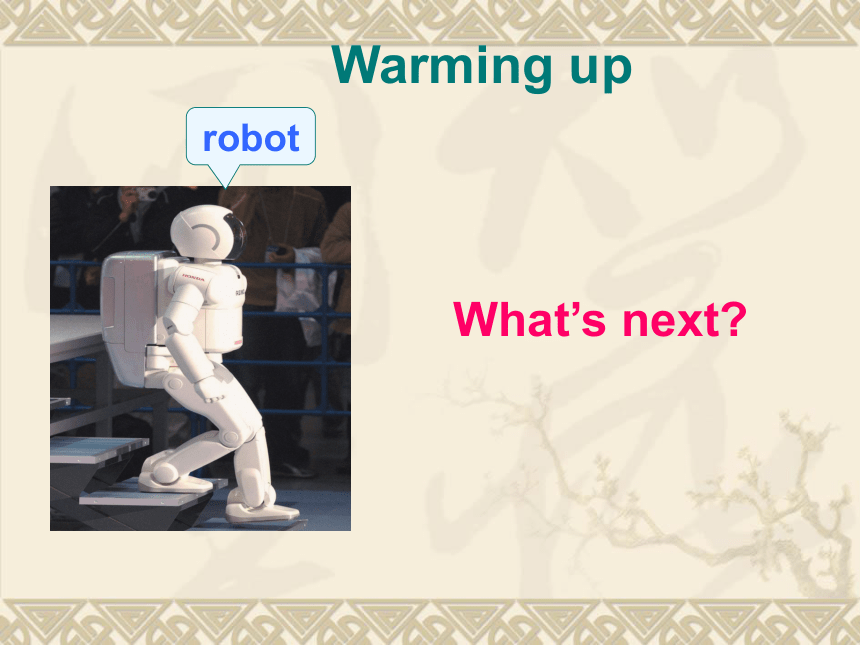
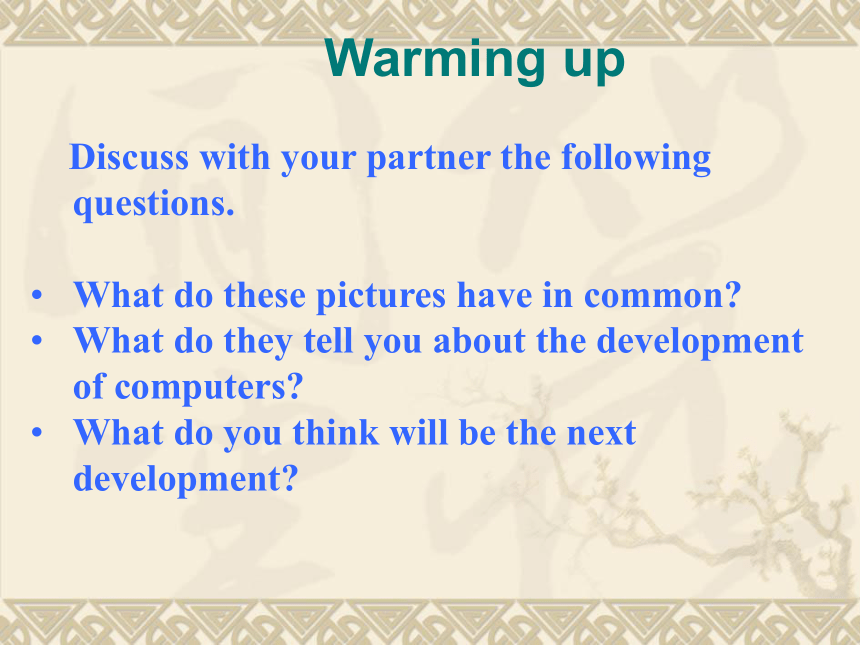
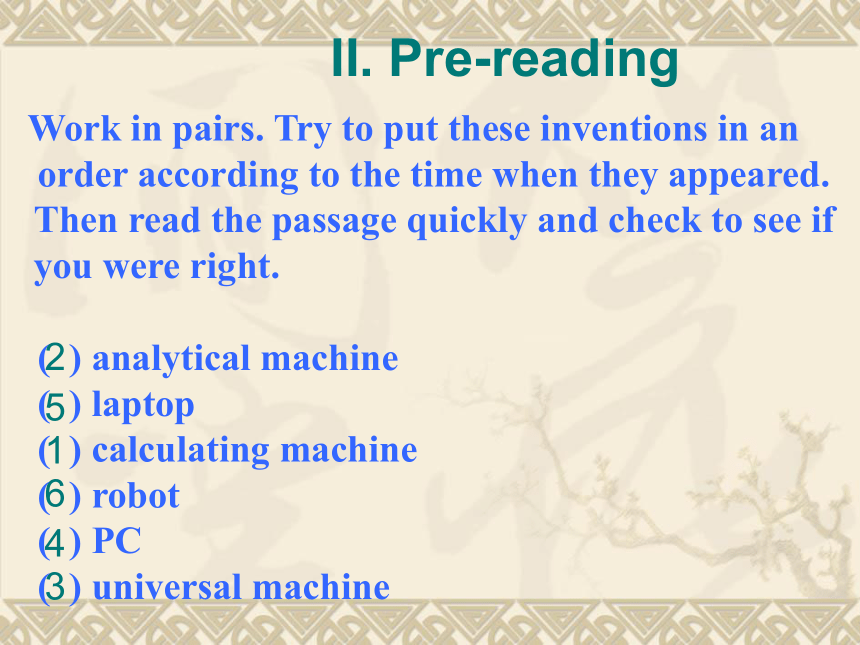
文档简介
课件19张PPT。 Unit 3 Computers
ReadingLook at the following pictures and say their English names.
I. Warming upabacuscalculator
Warming uphuge computerPC
Warming uplaptopPDA
Warming uprobotWhat’s next? Discuss with your partner the following questions.
What do these pictures have in common?
What do they tell you about the development of computers?
What do you think will be the next development?
Warming up Work in pairs. Try to put these inventions in an
order according to the time when they appeared. Then read the passage quickly and check to see if you were right.
( ) analytical machine
( ) laptop
( ) calculating machine
( ) robot
( ) PC
( ) universal machine
II. Pre-reading251643Read the passage quickly and check your prediction. Was it correct? What is the main idea of the passage?
This passage is about _________________________.
III. While-readingthe development of computers
In pairs guess the meaning of the following new words from the reading passage. Then check your guesses using a dictionary. A B
technological revolution
simplify application
personal solve
reality explore
happiness goalWhile-reading
根据构词法猜测词义
The meaning of the words in group A can all be guessed from their formation. Each pair of words has the same root(词根).
technology technological
simple simplify
person personal
real reality
happy happiness
While-reading
根据上下文猜测词义
The meaning of the words in group B can all be guessed from context.
Example:
revolution: From the previous sentence we know that after the work of the operator, “‘I’ could ‘think’ logically and produce an answer quicker than any person”, which indicates a great improvement, so “revolution” here may mean “a complete change”.
While-reading Read the passage again. Find the topic sentence of each paragraph and the supporting details.
Paragraph 1: Over time I have been changed quite a lot.
1. calculating machine
2. analytical machine
3. universal machine
4. laptop
While-reading
Paragraph 2: These changes only became possible as my memory improved.
1. tubes
2. transistors
3. chips
4. network
5. World Wide Web
While-reading
Paragraph 3: Since the 1970s many new applications have been found for me.
1. communications
2. finance
3. trade
4. robots
5. mobile phones
6. medical operations
7. space rockets
8. providing a life of high qualityWhile-reading
Summary
A topic sentence sets out the main idea of a paragraph.
A topic sentence is usually the first or last sentence of a paragraph.
While-readingRead the passage quickly and finish the timeline below.
1642: ___________________________________________
1822: The analytical machine was made by Charles Babbage.
____: ___________________________________________
1940s : __________________________________________
_____:The first family of computers was connected to each other.
1970s: __________________________________________
Now : __________________________________________
IV. Post -readingThe computer began as a calculating machine.
The computer grew rapidly both in size and in brainpower.
1936The computer had grown as large as a room.1960sComputers were used in offices and homes.Computers connect people all over the world together.
Post-reading Work in group of four and brainstorm a list of things that you, your school and your family use computers for.
Discuss how computers have changed our lives.
Think about what you would have to do if you could not use computers any more.
Give a report to the class. You can use the new words in the reading passage and the following expressions to help you in your discussion.
I think/don’t think that … Please give me your reasons.
What makes you think so? I think … because (of) …
As/Since …, I think … First … Second …
I agree/don’t agree … because…
I believe that …
Post-reading Read the passage again. Underline the sentences that you do not understand and try to solve the problems using context clues and the dictionary.V. Homework
ReadingLook at the following pictures and say their English names.
I. Warming upabacuscalculator
Warming uphuge computerPC
Warming uplaptopPDA
Warming uprobotWhat’s next? Discuss with your partner the following questions.
What do these pictures have in common?
What do they tell you about the development of computers?
What do you think will be the next development?
Warming up Work in pairs. Try to put these inventions in an
order according to the time when they appeared. Then read the passage quickly and check to see if you were right.
( ) analytical machine
( ) laptop
( ) calculating machine
( ) robot
( ) PC
( ) universal machine
II. Pre-reading251643Read the passage quickly and check your prediction. Was it correct? What is the main idea of the passage?
This passage is about _________________________.
III. While-readingthe development of computers
In pairs guess the meaning of the following new words from the reading passage. Then check your guesses using a dictionary. A B
technological revolution
simplify application
personal solve
reality explore
happiness goalWhile-reading
根据构词法猜测词义
The meaning of the words in group A can all be guessed from their formation. Each pair of words has the same root(词根).
technology technological
simple simplify
person personal
real reality
happy happiness
While-reading
根据上下文猜测词义
The meaning of the words in group B can all be guessed from context.
Example:
revolution: From the previous sentence we know that after the work of the operator, “‘I’ could ‘think’ logically and produce an answer quicker than any person”, which indicates a great improvement, so “revolution” here may mean “a complete change”.
While-reading Read the passage again. Find the topic sentence of each paragraph and the supporting details.
Paragraph 1: Over time I have been changed quite a lot.
1. calculating machine
2. analytical machine
3. universal machine
4. laptop
While-reading
Paragraph 2: These changes only became possible as my memory improved.
1. tubes
2. transistors
3. chips
4. network
5. World Wide Web
While-reading
Paragraph 3: Since the 1970s many new applications have been found for me.
1. communications
2. finance
3. trade
4. robots
5. mobile phones
6. medical operations
7. space rockets
8. providing a life of high qualityWhile-reading
Summary
A topic sentence sets out the main idea of a paragraph.
A topic sentence is usually the first or last sentence of a paragraph.
While-readingRead the passage quickly and finish the timeline below.
1642: ___________________________________________
1822: The analytical machine was made by Charles Babbage.
____: ___________________________________________
1940s : __________________________________________
_____:The first family of computers was connected to each other.
1970s: __________________________________________
Now : __________________________________________
IV. Post -readingThe computer began as a calculating machine.
The computer grew rapidly both in size and in brainpower.
1936The computer had grown as large as a room.1960sComputers were used in offices and homes.Computers connect people all over the world together.
Post-reading Work in group of four and brainstorm a list of things that you, your school and your family use computers for.
Discuss how computers have changed our lives.
Think about what you would have to do if you could not use computers any more.
Give a report to the class. You can use the new words in the reading passage and the following expressions to help you in your discussion.
I think/don’t think that … Please give me your reasons.
What makes you think so? I think … because (of) …
As/Since …, I think … First … Second …
I agree/don’t agree … because…
I believe that …
Post-reading Read the passage again. Underline the sentences that you do not understand and try to solve the problems using context clues and the dictionary.V. Homework
